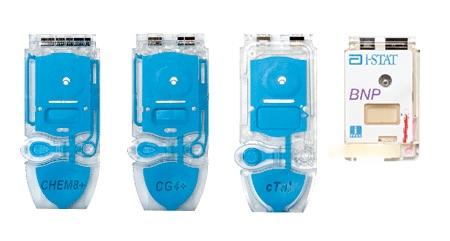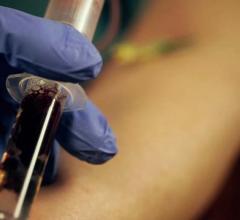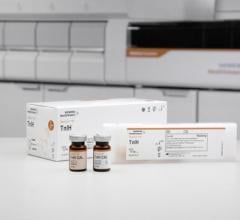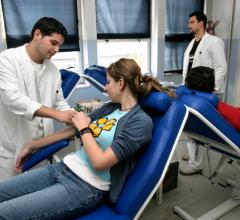
October 26, 2018 — For someone experiencing cardiac symptoms in the emergency room, every minute matters as physicians determine whether someone is having a heart attack. New data, published online in JAMA Cardiology, found a new blood test under development that is done right at the patient's side in as little as 15 minutes could identify nearly three-fifths (56.7 percent) of people at low risk of experiencing a heart attack. The results are similar to the results of a High Sensitive Troponin-I blood test done in the laboratory setting.1
More than 7 billion diagnostic tests are run in the U.S. each year to help physicians make accurate, timely decisions about a person's medical treatment.2 Point-of-care diagnostic tests, that can often provide results within minutes, are used globally as hospitals face increased pressures to address overcrowding in emergency rooms and longer wait times. The goal of with-patient diagnostic tests is to deliver results with accuracy similar to the gold standard of high-sensitivity lab tests. The findings from the study indicate this new point-of-care blood test could help physicians streamline how patients are triaged in the emergency room by reducing the time it takes to rule out a heart attack and accelerating a safe discharge for low-risk patients – all with an accuracy comparable to a high sensitive cardiac troponin test used in a core-laboratory.
"The initial findings from this study indicate that, for a substantial proportion of patients, it may be possible to safely rule out heart attacks within 15 minutes of blood drawn in the emergency department," said Martin Than, M.D., an emergency medicine specialist, director of emergency medicine research at Christchurch Public Health Hospital and one of the study's senior authors. "This is a major advancement in point-of-care test accuracy that may make possible significant improvements in patient care in both urban and rural settings."
Researchers in New Zealand evaluated 354 adults 18 years and older who entered an emergency department with symptoms of acute coronary syndrome, such as a heart attack. The patients' cardiac troponin levels, which have become the standard for aiding doctors in checking for a heart attack, were measured using two Abbott blood tests: the Architect High Sensitive Troponin-I (hsTnI) and the i-STAT TnI-Nx, a point-of-care diagnostic test under development. The study found:
Similar levels of accuracy between the two tests (area under the curve: 0.975 and 0.970 for the i-STAT TnI-Nx and hsTnI tests respectively); and
Similar abilities to rule out a heart attack using the Emergency Department Assessment of Chest Pain Score: 56.7 percent of patients were identified as low risk using i-STAT TnI-Nx, compared to 43.5 percent of patients using hsTnI test.
Troponin proteins are released from the heart and can be found at elevated levels in the blood when the heart muscle has been damaged due to lack of blood flow. The i-STAT cardiac troponin test from Abbott has been used in hospitals globally to help aid the physician in diagnosing heart attacks, right at the patient's bedside. Abbott's newest point-of-care test, that was used in the research and is not yet commercially available, includes several enhancements, such as magnetic technology.
This analysis, published online Oct. 17, is part of a prospective observational study. The study's primary outcome was the area under receiver-operator-characteristic curve (AUC) and sensitivity, negative predictive value (NPV) and proportion negative at thresholds with 100 percent sensitivity. A total of 354 participants aged 18 years old and older with signs of acute coronary syndrome, including a heart attack, were enrolled between July 5, 2016 and Jan. 5, 2018. The investigator-led study was supported by a research grant from Abbott which did not participate in the planning or conduct of the data analysis.
For more information: www.pointofcare.abbott.com
References
- Pickering, J.W. et al. JAMA Cardiol. 2018; doi:10.1001/jamacardio.2018.3368
- American Clinical Laboratory Association. Value of Lab Testing. Retrieved from: https://www.acla.com/value-of-lab-testing/


 October 09, 2019
October 09, 2019 









